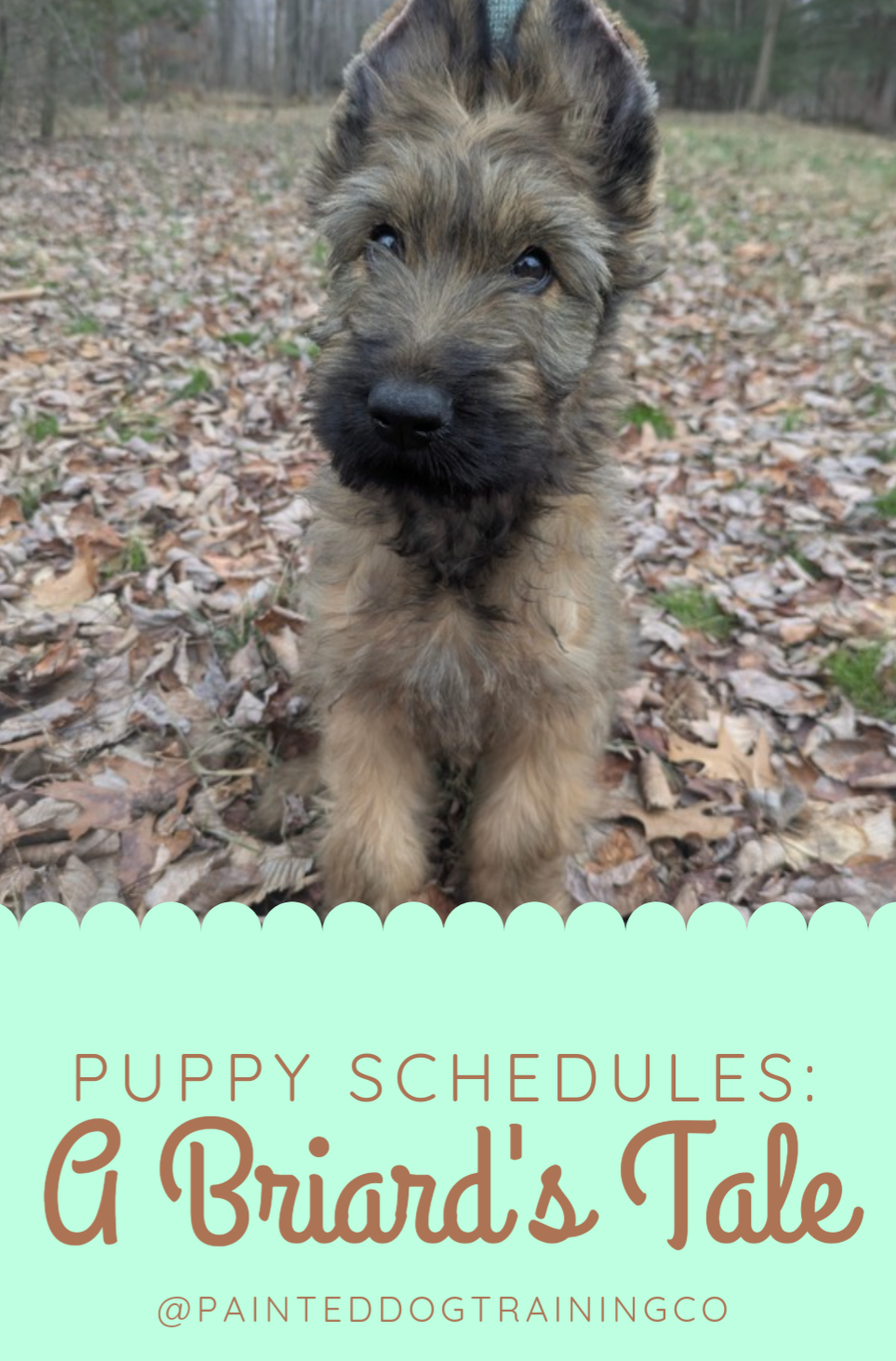This post contains affiliate links. These links come at no cost to you, but help us run the blog for free as we get a small commission when you use our links.
So, you have a new puppy! Congratulations! Get ready for cuteness overload, endless cuddles, and the occasional puddle on the floor. But don’t worry, this blog post is here to help you navigate the world of puppy schedules, with my own 12-week-old Briard, Siren, as our adorable guide.
Why Puppy Schedules Matter
Puppies thrive on consistency. A predictable routine helps them understand what’s expected, reduces anxiety, and aids in potty training. Think of it like this: a schedule is a roadmap for your puppy, guiding them through their day and helping them learn the rules of their new home.
Siren’s Day: A Sample Schedule
Siren, my little ball of fluff, is on a pretty tight schedule right now. Here’s a glimpse into our typical day:
Morning: Potty break first thing before a few minutes of cuddles! Then, it’s a quick play session, followed by some basic obedience training. We use a variety of training treats, and Siren loves them! From there, she gets some play time with me or the dogs. Afterward, she enjoys a puzzle toy or a chew in her crate(we love the Red Barn variety packs). This gives her a chance to settle down and relax.
Mid-morning: Potty break, of course! Then, maybe a short walk around the yard, exploring the exciting smells and sights. Remember, puppies this young shouldn’t be going on long walks, but a little sniffari in a safe area is perfect. We might let a dog or two out with her so she can play while she sniffs. Then some training before going back in her crate with breakfast and an enrichment activity. She may get free time after this, depending on our schedule that day.
Lunchtime: Siren’s meals are spread throughout the day. She gets her food through a combination of puzzle toys, training, and slow feeders. Sometimes, we even do some fun scatter feeding in the house or yard. This keeps her mentally stimulated and prevents her from gobbling down her food too quickly. She gets her potty break and play time, followed by training using her lunch.
Afternoon: Playtime! Siren loves playing with my other dogs. It’s important for her to learn social skills, but I also make sure she gets plenty of one-on-one playtime with me. This helps strengthen our bond and allows me to focus on her individual needs. We potty first or during (depending on where they’re playing), and then move into free time. From there, back in the crate with an enrichment activity for settle down time and a nap.
Late Afternoon: More training, another puzzle toy, and of course, a potty break! Mix some play time in there too.
Evening: Potty first, as always. A relaxing play session, followed by potty breaks every 20 minutes. This is when the bulk of her free time happens. Siren sleeps soundly through the night in her crate when it’s bedtime.
Important Note: Siren is never far from me when she’s out of her crate. Puppies this young need constant supervision. It’s crucial to prevent accidents and to start teaching good habits from day one. Don’t let your puppy roam free in the house unsupervised!
Potty Training Tips
One thing you’ll notice about Siren’s schedule is the frequent potty breaks. At 12 weeks old, she needs to go out every 20-30 minutes or so. This might seem like a lot, but trust me, it’s worth it. Consistent potty breaks help prevent accidents and make the training process much smoother.
Here are a few potty training tips:
Be observant: Learn your puppy’s cues. Are they sniffing around, circling, or squatting? These are signs they need to go out!
Reward success: Positive reinforcement is key. When your puppy eliminates outside, praise them enthusiastically and give them a treat.
Clean up accidents thoroughly: Use an enzymatic cleaner like this one to eliminate odors and discourage your puppy from repeating the mistake in the same spot.
Adventures with Siren
Every day or two, Siren goes on an adventure with me. This could be a trip to a pet friendly store, a car ride, or a visit to a friend’s house with a dog. These outings help socialize Siren and expose her to new sights, sounds, and smells.
Remember, socialization is crucial for puppies. It helps them develop into well-adjusted adult dogs. But always make sure the experiences are positive and age-appropriate. Socialization does NOT mean forcing them to meet every living creature in sight.
Your Puppy, Your Schedule
While Siren’s schedule provides a helpful example, remember that every puppy is different. You’ll need to adjust the timing and activities based on your puppy’s breed, age, energy level, and individual needs.
Don’t be afraid to experiment and find what works best for you and your furry buddy. And most importantly, enjoy this special time with your new puppy!




